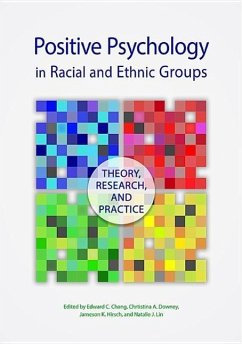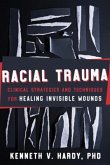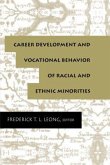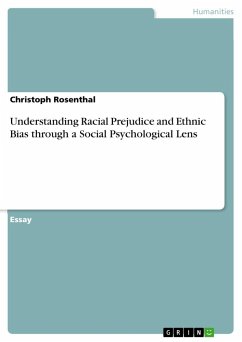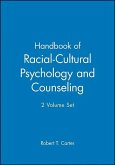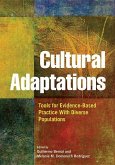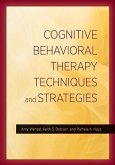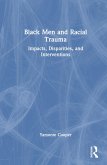Positive Psychology in Racial and Ethnic Groups
Theory, Research, and Practice
Herausgeber: Chang, Edward C; Lin, Natalie J; Hirsch, Jameson K; Downey, Christina A
Positive Psychology in Racial and Ethnic Groups
Theory, Research, and Practice
Herausgeber: Chang, Edward C; Lin, Natalie J; Hirsch, Jameson K; Downey, Christina A
- Gebundenes Buch
- Merkliste
- Auf die Merkliste
- Bewerten Bewerten
- Teilen
- Produkt teilen
- Produkterinnerung
- Produkterinnerung
Focuses specifically on how a culturally-informed approach to positive psychology can help capitalize on the strengths of racial minority groups and have a greater potential to positively impact their psychological well-being. The information presented in this volume can help clinicians use positive psychology to inspire minorities to be effective agents in their environments and communities.
Andere Kunden interessierten sich auch für
![Racial Trauma Racial Trauma]() Kenneth V HardyRacial Trauma39,99 €
Kenneth V HardyRacial Trauma39,99 €![Career Development and Vocational Behavior of Racial and Ethnic Minorities Career Development and Vocational Behavior of Racial and Ethnic Minorities]() Career Development and Vocational Behavior of Racial and Ethnic Minorities131,99 €
Career Development and Vocational Behavior of Racial and Ethnic Minorities131,99 €![Understanding Racial Prejudice and Ethnic Bias through a Social Psychological Lens Understanding Racial Prejudice and Ethnic Bias through a Social Psychological Lens]() Christoph RosenthalUnderstanding Racial Prejudice and Ethnic Bias through a Social Psychological Lens15,95 €
Christoph RosenthalUnderstanding Racial Prejudice and Ethnic Bias through a Social Psychological Lens15,95 €![Handbook of Racial-Cultural Psychology and Counseling, 2 Volume Set Handbook of Racial-Cultural Psychology and Counseling, 2 Volume Set]() Handbook of Racial-Cultural Psychology and Counseling, 2 Volume Set239,99 €
Handbook of Racial-Cultural Psychology and Counseling, 2 Volume Set239,99 €![Cultural Adaptations Cultural Adaptations]() Cultural Adaptations69,99 €
Cultural Adaptations69,99 €![Cognitive Behavioral Therapy Techniques and Strategies Cognitive Behavioral Therapy Techniques and Strategies]() Amy WenzelCognitive Behavioral Therapy Techniques and Strategies89,99 €
Amy WenzelCognitive Behavioral Therapy Techniques and Strategies89,99 €![Black Men and Racial Trauma Black Men and Racial Trauma]() Yamonte CooperBlack Men and Racial Trauma187,99 €
Yamonte CooperBlack Men and Racial Trauma187,99 €-
-
-
Focuses specifically on how a culturally-informed approach to positive psychology can help capitalize on the strengths of racial minority groups and have a greater potential to positively impact their psychological well-being. The information presented in this volume can help clinicians use positive psychology to inspire minorities to be effective agents in their environments and communities.
Hinweis: Dieser Artikel kann nur an eine deutsche Lieferadresse ausgeliefert werden.
Hinweis: Dieser Artikel kann nur an eine deutsche Lieferadresse ausgeliefert werden.
Produktdetails
- Produktdetails
- Verlag: American Psychological Association (APA)
- Seitenzahl: 464
- Erscheinungstermin: 18. Januar 2016
- Englisch
- Abmessung: 259mm x 183mm x 23mm
- Gewicht: 762g
- ISBN-13: 9781433821486
- ISBN-10: 1433821486
- Artikelnr.: 44159799
- Herstellerkennzeichnung
- Libri GmbH
- Europaallee 1
- 36244 Bad Hersfeld
- gpsr@libri.de
- Verlag: American Psychological Association (APA)
- Seitenzahl: 464
- Erscheinungstermin: 18. Januar 2016
- Englisch
- Abmessung: 259mm x 183mm x 23mm
- Gewicht: 762g
- ISBN-13: 9781433821486
- ISBN-10: 1433821486
- Artikelnr.: 44159799
- Herstellerkennzeichnung
- Libri GmbH
- Europaallee 1
- 36244 Bad Hersfeld
- gpsr@libri.de
Edited by Edward C. Chang, Christina A. Downey, Jameson K. Hirsch, and Natalie J. Lin
Contributors
Series Foreword
Frederick T. L. Leong
I. Introduction
1. Positive Psychology in Racial and Ethnic Groups: A Second Call to
Action!
Edward C. Chang, Christina A. Downey, Jameson K. Hirsch, and Natalie
J. Lin
2. Positive Psychology in the Context of Race and Ethnicity
Elizabeth L. Jeglic, Regina Miranda, and Lillian Polanco-Roman
II. Theory and Research
1. Positive Psychology in Asian Americans: Theory and Research
Lucy Zhang Bencharit and Jeanne L. Tsai
2. Latina/os — Drive, Community, and Spirituality: The Strength Within (
SOMOS Latina/os — Ganas, Comunidad, y El Espíritu: La Fuerza Que
Llevamos Por Dentro)
Jeanett Castellanos and Alberta M. Gloria
3. Positive Psychology in African Americans
Jacqueline S. Mattis, Nyasha Grayman Simpson, Wizdom Powell, Riana
Elyse Anderson, Lawanna R. Kimbro, and Jacob H. Mattis
4. Positive Psychology in American Indians
Gayle Skawennio Morse, Julie Guay McIntyre, and Jeff King
III. Assessment
1. Positive Psychology Assessment in Asian Americans
Elizabeth A. Yu, Edward C. Chang, Hongfei Yang, and Tina Yu
2. Positive Psychology Assessment Among Latinos
Rosemary Gonzalez and Amado M. Padilla
3. Positive Psychology Assessment in African Americans
Laura P. Kohn-Wood and Alvin Thomas
4. Positive Psychology Assessment in American Indians
Jeff King
IV. Practice
1. Social Connectedness Can Lead to Happiness: Positive Psychology and
Asian Americans
Michi Fu and Shannen Vong
2. Positive Psychology Practice With Latin Americans
Marisa J. Perera, Elizabeth A. Yu, Shao Wei Chia, Tina Yu, and
Christina A. Downey
3. Positive Psychology Practice With African Americans: Mental Health
Challenges and Treatment
Sussie Eshun and Esther Mortimer Packer
4. Positive Psychology Practice With Native Americans
Michael T. Garrett, J. T. Garrett, Russ Curtis, Mark Parrish, Tarrell
Awe Agahe Portman, Lisa Grayshield, and Cyrus Williams
V. Conclusion
1. Challenges and Prospects for Positive Psychology Research, Theory,
Assessment, and Practice in a Multiracial and Multiethnic World
Christina A. Downey, Edward C. Chang, Jameson K. Hirsch, and Natalie
J. Lin
Index
About the Editors
Series Foreword
Frederick T. L. Leong
I. Introduction
1. Positive Psychology in Racial and Ethnic Groups: A Second Call to
Action!
Edward C. Chang, Christina A. Downey, Jameson K. Hirsch, and Natalie
J. Lin
2. Positive Psychology in the Context of Race and Ethnicity
Elizabeth L. Jeglic, Regina Miranda, and Lillian Polanco-Roman
II. Theory and Research
1. Positive Psychology in Asian Americans: Theory and Research
Lucy Zhang Bencharit and Jeanne L. Tsai
2. Latina/os — Drive, Community, and Spirituality: The Strength Within (
SOMOS Latina/os — Ganas, Comunidad, y El Espíritu: La Fuerza Que
Llevamos Por Dentro)
Jeanett Castellanos and Alberta M. Gloria
3. Positive Psychology in African Americans
Jacqueline S. Mattis, Nyasha Grayman Simpson, Wizdom Powell, Riana
Elyse Anderson, Lawanna R. Kimbro, and Jacob H. Mattis
4. Positive Psychology in American Indians
Gayle Skawennio Morse, Julie Guay McIntyre, and Jeff King
III. Assessment
1. Positive Psychology Assessment in Asian Americans
Elizabeth A. Yu, Edward C. Chang, Hongfei Yang, and Tina Yu
2. Positive Psychology Assessment Among Latinos
Rosemary Gonzalez and Amado M. Padilla
3. Positive Psychology Assessment in African Americans
Laura P. Kohn-Wood and Alvin Thomas
4. Positive Psychology Assessment in American Indians
Jeff King
IV. Practice
1. Social Connectedness Can Lead to Happiness: Positive Psychology and
Asian Americans
Michi Fu and Shannen Vong
2. Positive Psychology Practice With Latin Americans
Marisa J. Perera, Elizabeth A. Yu, Shao Wei Chia, Tina Yu, and
Christina A. Downey
3. Positive Psychology Practice With African Americans: Mental Health
Challenges and Treatment
Sussie Eshun and Esther Mortimer Packer
4. Positive Psychology Practice With Native Americans
Michael T. Garrett, J. T. Garrett, Russ Curtis, Mark Parrish, Tarrell
Awe Agahe Portman, Lisa Grayshield, and Cyrus Williams
V. Conclusion
1. Challenges and Prospects for Positive Psychology Research, Theory,
Assessment, and Practice in a Multiracial and Multiethnic World
Christina A. Downey, Edward C. Chang, Jameson K. Hirsch, and Natalie
J. Lin
Index
About the Editors
Contributors
Series Foreword
Frederick T. L. Leong
I. Introduction
1. Positive Psychology in Racial and Ethnic Groups: A Second Call to
Action!
Edward C. Chang, Christina A. Downey, Jameson K. Hirsch, and Natalie
J. Lin
2. Positive Psychology in the Context of Race and Ethnicity
Elizabeth L. Jeglic, Regina Miranda, and Lillian Polanco-Roman
II. Theory and Research
1. Positive Psychology in Asian Americans: Theory and Research
Lucy Zhang Bencharit and Jeanne L. Tsai
2. Latina/os — Drive, Community, and Spirituality: The Strength Within (
SOMOS Latina/os — Ganas, Comunidad, y El Espíritu: La Fuerza Que
Llevamos Por Dentro)
Jeanett Castellanos and Alberta M. Gloria
3. Positive Psychology in African Americans
Jacqueline S. Mattis, Nyasha Grayman Simpson, Wizdom Powell, Riana
Elyse Anderson, Lawanna R. Kimbro, and Jacob H. Mattis
4. Positive Psychology in American Indians
Gayle Skawennio Morse, Julie Guay McIntyre, and Jeff King
III. Assessment
1. Positive Psychology Assessment in Asian Americans
Elizabeth A. Yu, Edward C. Chang, Hongfei Yang, and Tina Yu
2. Positive Psychology Assessment Among Latinos
Rosemary Gonzalez and Amado M. Padilla
3. Positive Psychology Assessment in African Americans
Laura P. Kohn-Wood and Alvin Thomas
4. Positive Psychology Assessment in American Indians
Jeff King
IV. Practice
1. Social Connectedness Can Lead to Happiness: Positive Psychology and
Asian Americans
Michi Fu and Shannen Vong
2. Positive Psychology Practice With Latin Americans
Marisa J. Perera, Elizabeth A. Yu, Shao Wei Chia, Tina Yu, and
Christina A. Downey
3. Positive Psychology Practice With African Americans: Mental Health
Challenges and Treatment
Sussie Eshun and Esther Mortimer Packer
4. Positive Psychology Practice With Native Americans
Michael T. Garrett, J. T. Garrett, Russ Curtis, Mark Parrish, Tarrell
Awe Agahe Portman, Lisa Grayshield, and Cyrus Williams
V. Conclusion
1. Challenges and Prospects for Positive Psychology Research, Theory,
Assessment, and Practice in a Multiracial and Multiethnic World
Christina A. Downey, Edward C. Chang, Jameson K. Hirsch, and Natalie
J. Lin
Index
About the Editors
Series Foreword
Frederick T. L. Leong
I. Introduction
1. Positive Psychology in Racial and Ethnic Groups: A Second Call to
Action!
Edward C. Chang, Christina A. Downey, Jameson K. Hirsch, and Natalie
J. Lin
2. Positive Psychology in the Context of Race and Ethnicity
Elizabeth L. Jeglic, Regina Miranda, and Lillian Polanco-Roman
II. Theory and Research
1. Positive Psychology in Asian Americans: Theory and Research
Lucy Zhang Bencharit and Jeanne L. Tsai
2. Latina/os — Drive, Community, and Spirituality: The Strength Within (
SOMOS Latina/os — Ganas, Comunidad, y El Espíritu: La Fuerza Que
Llevamos Por Dentro)
Jeanett Castellanos and Alberta M. Gloria
3. Positive Psychology in African Americans
Jacqueline S. Mattis, Nyasha Grayman Simpson, Wizdom Powell, Riana
Elyse Anderson, Lawanna R. Kimbro, and Jacob H. Mattis
4. Positive Psychology in American Indians
Gayle Skawennio Morse, Julie Guay McIntyre, and Jeff King
III. Assessment
1. Positive Psychology Assessment in Asian Americans
Elizabeth A. Yu, Edward C. Chang, Hongfei Yang, and Tina Yu
2. Positive Psychology Assessment Among Latinos
Rosemary Gonzalez and Amado M. Padilla
3. Positive Psychology Assessment in African Americans
Laura P. Kohn-Wood and Alvin Thomas
4. Positive Psychology Assessment in American Indians
Jeff King
IV. Practice
1. Social Connectedness Can Lead to Happiness: Positive Psychology and
Asian Americans
Michi Fu and Shannen Vong
2. Positive Psychology Practice With Latin Americans
Marisa J. Perera, Elizabeth A. Yu, Shao Wei Chia, Tina Yu, and
Christina A. Downey
3. Positive Psychology Practice With African Americans: Mental Health
Challenges and Treatment
Sussie Eshun and Esther Mortimer Packer
4. Positive Psychology Practice With Native Americans
Michael T. Garrett, J. T. Garrett, Russ Curtis, Mark Parrish, Tarrell
Awe Agahe Portman, Lisa Grayshield, and Cyrus Williams
V. Conclusion
1. Challenges and Prospects for Positive Psychology Research, Theory,
Assessment, and Practice in a Multiracial and Multiethnic World
Christina A. Downey, Edward C. Chang, Jameson K. Hirsch, and Natalie
J. Lin
Index
About the Editors

